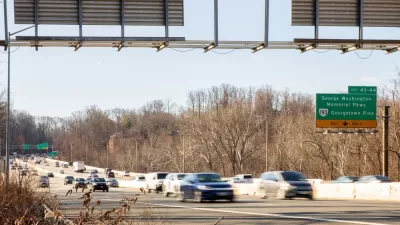A recent article addresses the illogical planning agenda set by states (Missouri, in this case) because local governments (St. Louis, in this case) lack a coherent planning vision. The situation is surely not unique in the annals of planning.

Alex Ihnen starts a recent appraisal of planning in St. Louis with some strong words about the ad hoc method by which planning has been conducted over the last 65+ years. "The City of St. Louis doesn’t have a plan. Well, technically the city does have a comprehensive plan, dating from 1948. That’s not quite fair. Although there has been no new comprehensive plan in 66 years, plenty of planning, zoning overlays, street projects, and more have taken place. There’s even a 260 page encyclopedic sustainability plan that’s spawned an initial 29 priorities across seven categories sufficiently vague and unambitious as to be meaningless. The point is that the city doesn’t have a focused plan to direct urban development. It most surely doesn’t have an operational transportation plan."
Ihnen's argument is that state departments of transportation "are uniquely positioned to thrive in such a vacuum." So in exchange for coherent urban policies, cities like Ihnen's St. Louis instead get "build more roads"—no matter if the city's population is shrinking. "What kind of city do we want, regardless of economic development promises (guesses)? The policies of the past 60 years have failed St. Louis and cities like it. The absence of an urban political lobby, and highly fractured government, has ceded policymaking to highway engineers and their enablers," writes Ihnen.
Ihnen's argument touches on the loss of citizen empowerment, the inability of DOTs to reconsider projections for vehicle miles traveled, and the "ahistoric leaps in logic" required to generate a "build more roads" argument.
Then there's what's lost when the trend is allowed to persist: "When a city defers its self-identity to highway building, you get highways. At some point, residents of the city must understand and speak to their own interests. This type of destructive and wasteful development isn’t any city’s fate, it’s a choice. And if a choice isn’t made, a vision not articulated and fought for? Well, the highway department gets to plan your city."
FULL STORY: When the DOT Plans Your City

Planetizen Federal Action Tracker
A weekly monitor of how Trump’s orders and actions are impacting planners and planning in America.

Maui's Vacation Rental Debate Turns Ugly
Verbal attacks, misinformation campaigns and fistfights plague a high-stakes debate to convert thousands of vacation rentals into long-term housing.

San Francisco Suspends Traffic Calming Amidst Record Deaths
Citing “a challenging fiscal landscape,” the city will cease the program on the heels of 42 traffic deaths, including 24 pedestrians.

Defunct Pittsburgh Power Plant to Become Residential Tower
A decommissioned steam heat plant will be redeveloped into almost 100 affordable housing units.

Trump Prompts Restructuring of Transportation Research Board in “Unprecedented Overreach”
The TRB has eliminated more than half of its committees including those focused on climate, equity, and cities.

Amtrak Rolls Out New Orleans to Alabama “Mardi Gras” Train
The new service will operate morning and evening departures between Mobile and New Orleans.
Urban Design for Planners 1: Software Tools
This six-course series explores essential urban design concepts using open source software and equips planners with the tools they need to participate fully in the urban design process.
Planning for Universal Design
Learn the tools for implementing Universal Design in planning regulations.
Heyer Gruel & Associates PA
JM Goldson LLC
Custer County Colorado
City of Camden Redevelopment Agency
City of Astoria
Transportation Research & Education Center (TREC) at Portland State University
Jefferson Parish Government
Camden Redevelopment Agency
City of Claremont




























